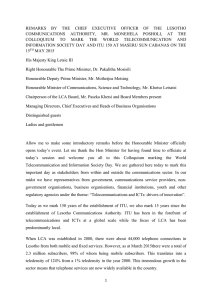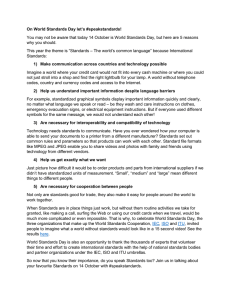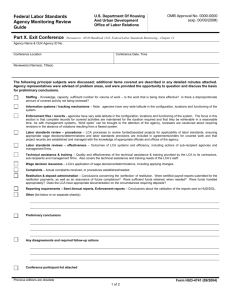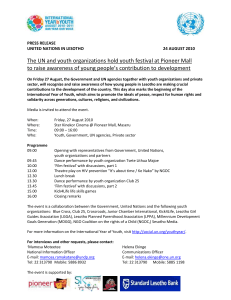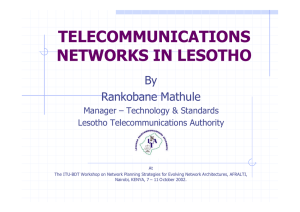)
advertisement
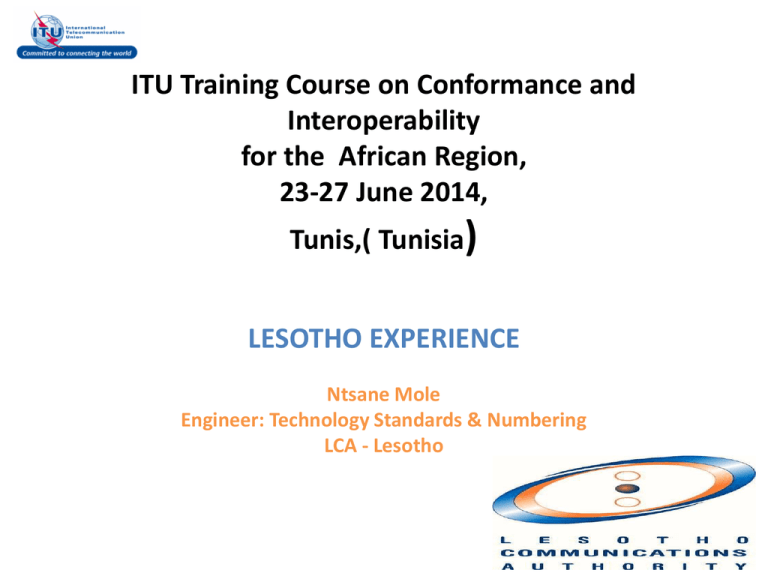
ITU Training Course on Conformance and Interoperability for the African Region, 23-27 June 2014, Tunis,( Tunisia) LESOTHO EXPERIENCE Ntsane Mole Engineer: Technology Standards & Numbering LCA - Lesotho BACKGROUND • Lesotho is a mountainous country totally landlocked by the Republic of South Africa • With the total population of around 1.9 million people • Only 2 public communications service providers and 6 internet service providers. • It has 11 sound broadcasting players. • As at 31 march 2013, the number of subscribers for both fixed and mobile services per 100 inhabitants ,also referred to as teledensity, amounted to 87% up from 72% in the previous year. ACT NO.4 OF 2012 • This is an ACT to provide for the regulation of the telecommunications, broadcasting and postal sectors and for related matters. Part II of the ACT under General duties of the Authority provides: • Section 4 (e) - to protect the interest of consumers of communications services. • Section 5 (f) – establish technical standards and grant authorizations, for sale or use of equipment used to provide communications services. • Section 5 (u) – Conduct investigations, adjudicate alleged contraventions of this ACT or of any regulation, rule, directive or code, and take appropriate enforcement action C&I Homologation procedures of ICT products • • • • • • • • • • Why should equipment be type approved What equipment must be registered for type approval Type Approval Procedure Application documents Fees Renewal and cancellation of Registration Type Approval for Changes to Equipment Type Approval Standards Test Results Surveillance Why should equipment be type approved • communications equipment does not present health and safety hazards to the public or users • Operating frequencies of communications equipment complies with the national frequency plan as published and amended from time to time • no harmful interference is caused to other radio-communications services What equipment must be registered for type approval • All telecommunications terminal equipment and all radio equipment must be registered for type approval Type Approval Procedure • The Authority does not conduct tests on the equipment but relies on test results carried out by accredited test laboratories and other type approval bodies • Application for type approval must be made using the application form that can be obtained from the Authority’s offices or website www.lca.org.ls • One application may cover a range of related products provided that the application details the differences and the compliance of all of them is justified on the basis of the supporting documentation Type Approval Procedure Cont’d • Separate applications should be made for models supplied under different brand names. The brand names will be separately listed in the register maintained by LCA. • All communications equipment that is intended to be used in Lesotho must comply with International standards (ISO/IEC) or ETSI or relevant ITU standards with respect to electromagnetic compatibility and safety requirements Application documents • Declaration of Conformity • Test reports and/or certificates of compliance issued by accredited independent test laboratories • Technical specifications of the equipment/data sheets FEES • Non-refundable application fee shall be payable by the applicant at the time of submission of application. Renewal and cancellation of Registration • Registration will normally be granted on a permanent basis excluding upgrades of or new models • LCA can cancel a registration at any time where it has a reason to believe that the relevant regulations and technical requirements have not been observed. Type Approval for Changes to Equipment If a change to any communications equipment introduces changes of the following, then a new application for Type Approval must be made • physical network interface • radio frequencies utilization • brand name • product name • model number • compliance with the Declaration of Conformity Type Approval Standards • The Type Approval Standards used in Lesotho are based on international standards from but not limited to the following standards bodies: • European committee for electrotechnical standardization (CENELEC). • The International Electrotechnical Commission (IEC) and its International Special Committee on Radio Interference (CISPR). • The European Telecommunications Standards Institute (ETSI) • International Telecommunications Union (ITU) Test Results • Test reports must be from an Accredited Testing Laboratory, this is any laboratory accredited by its own national body and/or other recognized accreditation body in terms of ISO/IEC 17025 requirements. The test report must match the equipment in respect of which the application was made, that is no modifications are allowed Surveillance • All parties involved in the import, manufacture and supply of equipment are expected to satisfy themselves that the equipment in which they deal complies with the relevant technical specifications and that the documentation that accompanies it is authentic • LCA performs checks and inspection on terminal equipment and radio equipment from time to time • This may arise as a response to a complaint, a report of interference, visual inspection of products in a retail outlet, inappropriate advertising or simply a random selection. Challenges and Way forward • Authenticating the Test reports. • Interpretation of the test report • Implementation of the RMA’s Thank you
